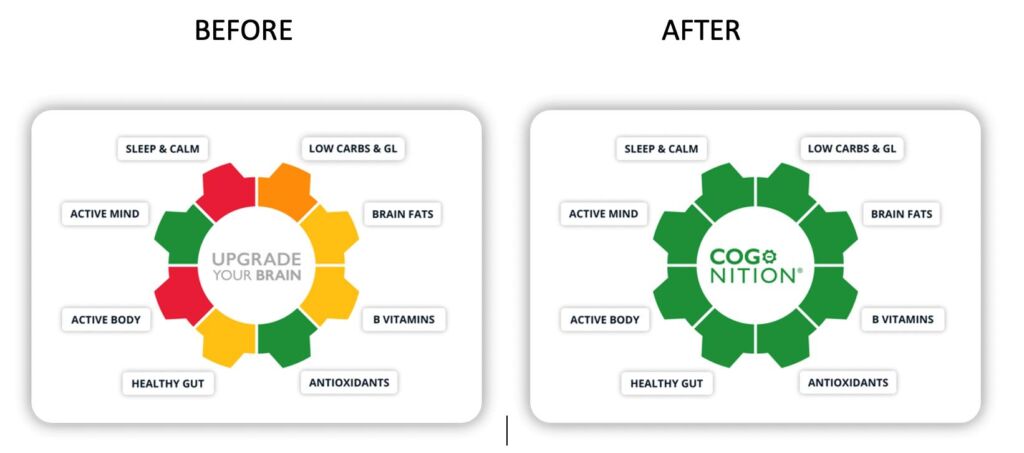
The conventional view is that genes play a big part and that factors under your control, including diet, lifestyle and your health status, account for up to 40% of risk. This means up to 40% of dementia cases could be prevented or delayed. Genes actually account for less than 1% of cases of Alzheimer’s. But a new study, based on following 344,000 people over 15 years from the UK BioBank, estimates that “up to 73% of cases could be prevented” by targetting risk factors largely under your control.
The authors of the study, published in the Nature Human Behaviour journal[1], investigated 210 modifiable risk factors.
They found that increasing hand grip strength, a good reflection of physical strength, increasing leisure or social activities or time spent in sports clubs or gyms, spending less time watching TV or on a computer, having better dental health, drinking more water, not dozing off in the day and sleeping between 7 to 9 hours a night, not smoking or being exposed to smoke and having better lung function were all associated with less risk.
Being unemployed, having a low income, having diabetes, high blood pressure or having had a stroke or brain injury all increased risk. Inheriting the so-called ‘Alzheimer’s gene’ ApoE4 didn’t make any significant difference to overall risk.

However, even this figure of 73% may be an underestimate as this study excluded blood test measures.
“We have probably under-estimated the power of prevention,” says Professor David Smith from the University of Oxford, one of the study authors. “Even this figure of up to 73% of cases preventable could be higher if a person’s omega-3 and B vitamin status, measured by a blood test for homocysteine that any GP can do, were taken into account.”
While the BioBank study didn’t include blood test measures of either homocysteine or omega-3, scientists at the US National Institutes of Health have attributed 22% of the risk of Alzheimer’s to raised blood homocysteine and 22% to a lack of omega-3[2].
“These have been shown to predict risk but were beyond the scope of this study.” confirmed the study author, Professor Jin-Tai Yu from Shanghai’s Fudan University. “Homocysteine-lowering treatment with B vitamins, especially B12, is one of the most promising interventions for dementia prevention.”
Professor Smith’s group at Oxford University tested the effects of giving B vitamins (B6, B12, folate) versus placebo to those with pre-dementia and found that the 10p a day supplements halved the rate of brain shrinkage in one year and virtually stopped further memory loss.[3]

“The greatest effect we found in our trial was in those in the top third of DHA for the blood level of DHA (an omega-3) found in fish. Those with high DHA given B vitamins reduced their rate of brain shrinkage by 73%, down to the level normally seen in older people with loss of cognitive function. They also had virtually no further memory loss, and almost a third ended the trial with no clinical dementia rating at all.”
The benefit of omega-3 was also confirmed in a major study this year of over 100,000 people, finding that increased omega-3 cut the risk of dementia or cognitive decline by around 20%. An increase in intake of omega-3 DHA of 200mg, which is what is found in either a serving of fish or a fish oil supplement, decreased risk by almost a fifth.[4]

One charity taking prevention seriously is the charity Food for the Brain. They offer, at foodforthebrain.org, a free online Cognitive Function Test, which includes a Dementia Risk Index questionnaire assessing your diet, omega-3 and B vitamin status, and lifestyle and an optional home-test kit for pinprick blood tests.

“Over 400,000 people have taken our validated Cognitive Function Test, which not only shows a person their cognitive status right now but also their future risk based on our Dementia Risk Index questionnaire, what’s driving future risk and what they can easily do right now to lower it. If all modifiable risk factors are taken into account, including B vitamins and omega-3, it is highly likely a person could reduce risk by over 80%.” says their CEO, Patrick Holford.
“The government has pledged £160 million a year for dementia prevention research, but we are not seeing any of this going into easy prevention wins. Most seem to be fuelling drug research for an apparent ‘cure’. Alzheimer’s is preventable but not curable. You cannot reverse holes in the brain. With over 200,000 people diagnosed every year with dementia, if prevention were taken seriously, we could halve the number of people developing this terrible but preventable disease.”
About the Food for the Brain Foundation
The Food for the Brain Foundation (foodforthebrain.org) is an educational and research charity focussing on dementia prevention. It’s free online validated Cognitive Function Test, followed by the Dementia Risk Index questionnaire assessing eight drivers of dementia, including ‘brain fats’ and ‘low carbs & GL’, thus identifying those eating too many carbs and not enough brain fats, then advising them what to do.

Sources:
- [1] Zhang, Y., et al. Nature Human Behaviour. 2023 7, 1185–1195
- [2] Beydoun MA., et al. BMC Public Health. 2014 Jun 24;14:643.
- [3] Jernerén F., et al. Am J Clin Nutr. 2015 Jul;102(1):215-21.
- [3] Oulhaj A., et al. J Alzheimers Dis. 2016;50(2):547-57.
- [4] Wei B., et al. Am J Clin Nutr 2023 Jun;117(6):1096-1109.
Read more health news, research and features here.

![]()




You must be logged in to post a comment.